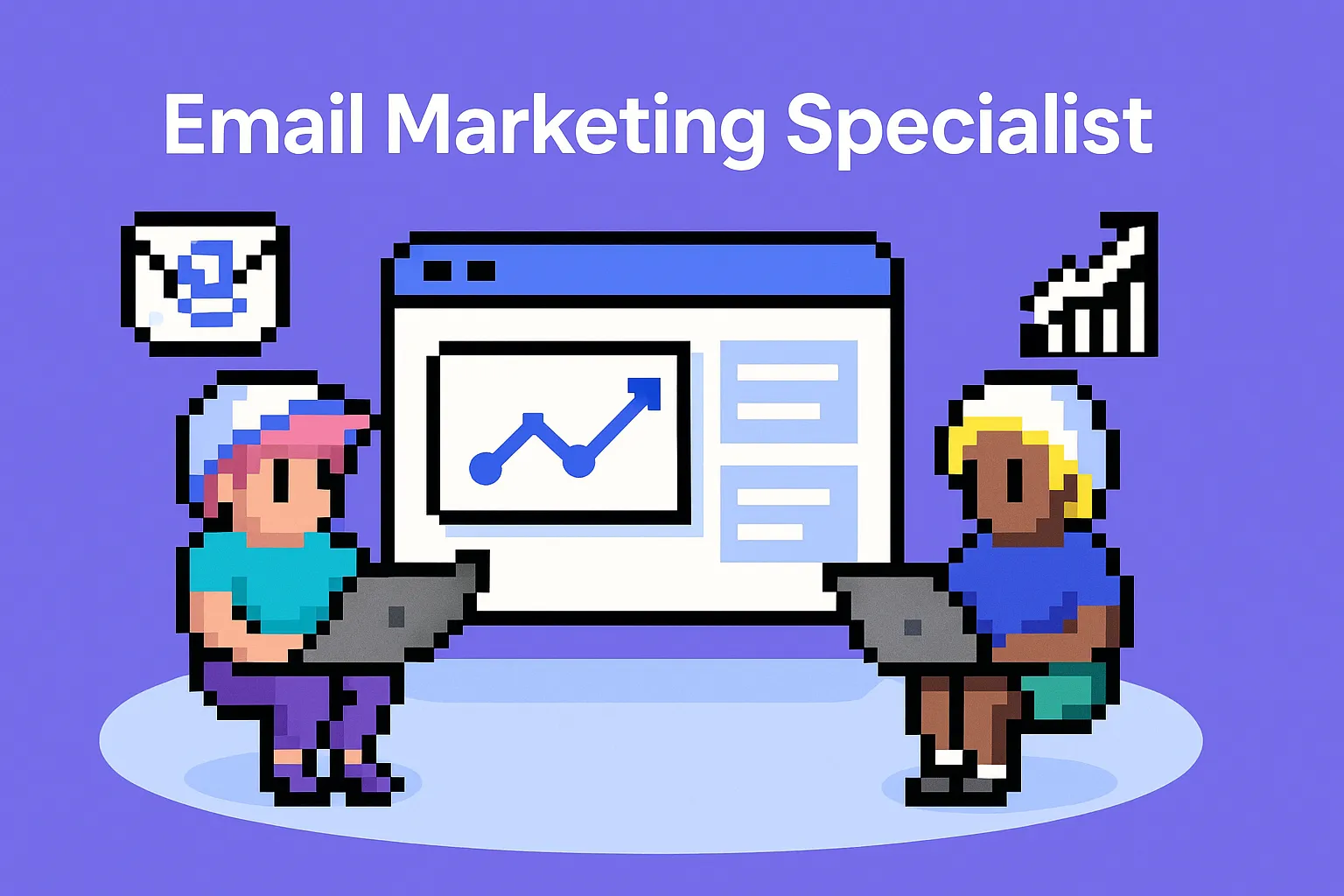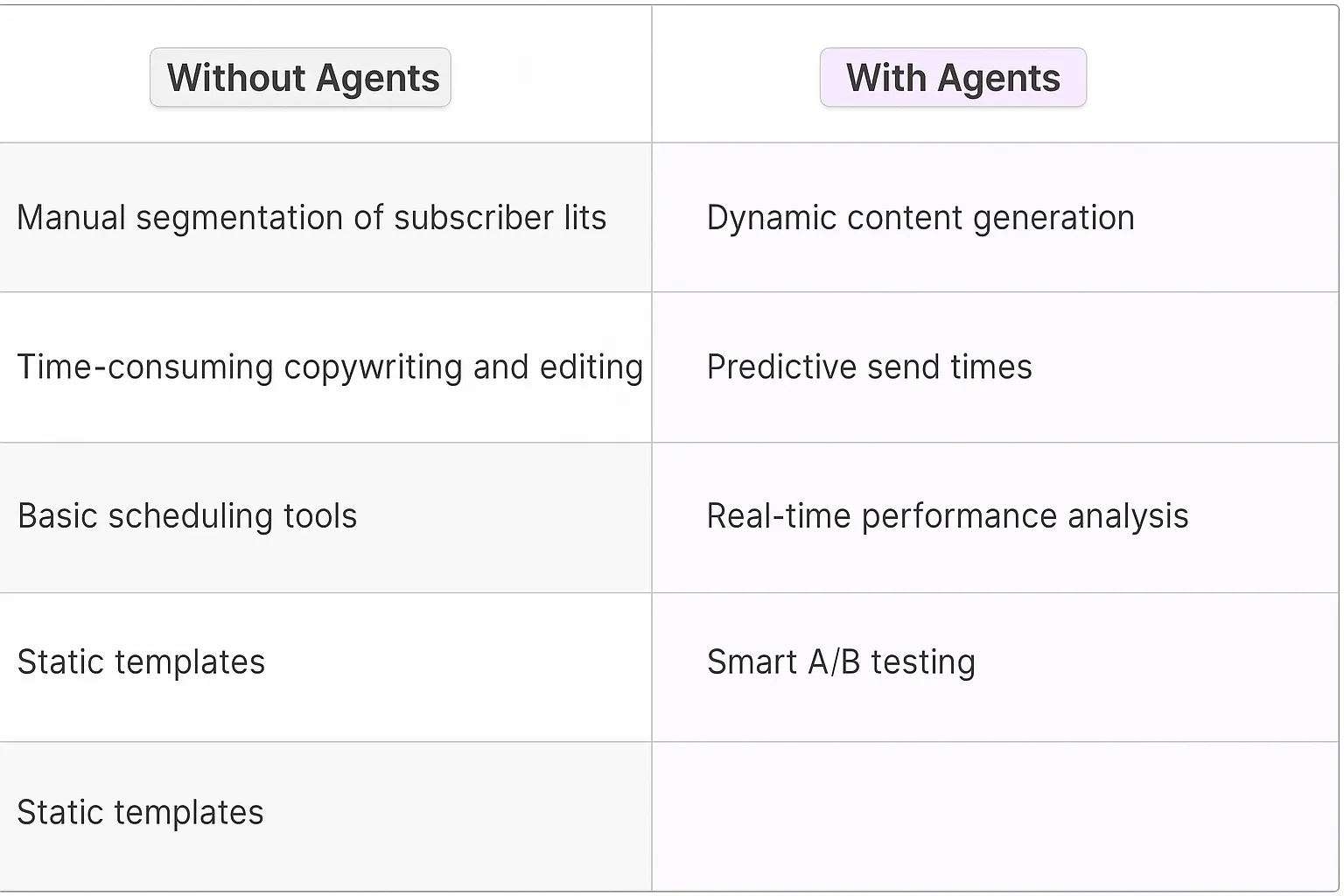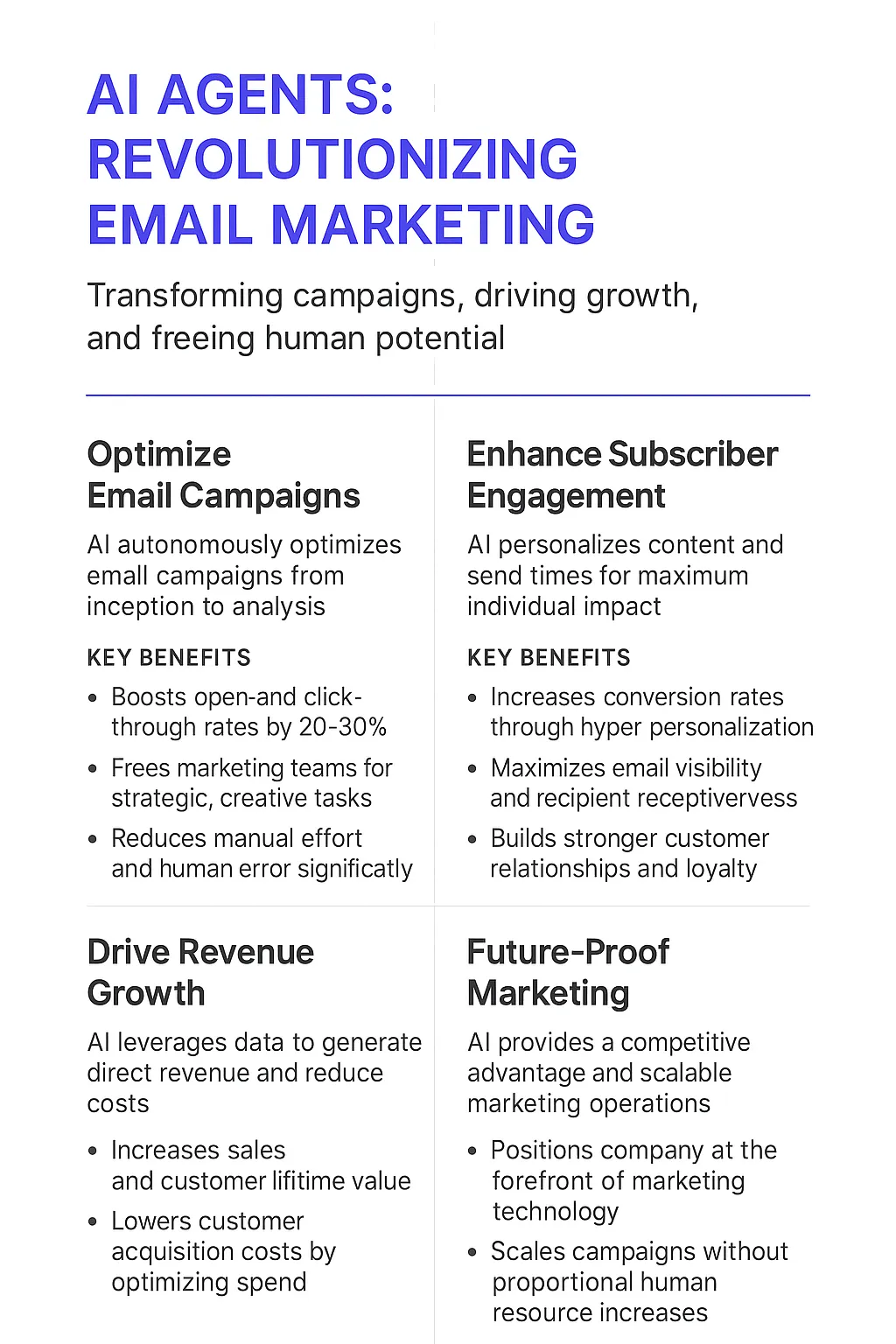An Email Marketing Specialist AI Agent is a sophisticated digital teammate that combines machine learning capabilities with deep email marketing expertise. It processes vast amounts of subscriber data, engagement metrics, and campaign performance indicators to optimize every aspect of email marketing operations. Unlike basic automation tools, these agents actively learn from results and adapt their strategies in real-time.

Traditional email marketing relied heavily on manual processes that consumed massive chunks of time. Marketing teams juggled multiple spreadsheets, struggled with A/B testing calculations, and spent hours crafting subject lines. They'd use basic automation tools that required constant tweaking and maintenance, while still needing human oversight for every campaign decision.
The old workflow typically involved:
The growth loops in email marketing fundamentally change with AI agents. These digital teammates operate as specialized members of your marketing team, bringing pattern recognition and data processing capabilities that humans simply can't match.
Key advantages include:
The network effects are particularly interesting here - as these AI agents process more campaigns and interact with more subscribers, their understanding of what drives engagement deepens. This creates a compounding advantage where each email sent makes future campaigns more effective.
What's particularly fascinating is how these AI agents handle the cold start problem in email marketing. They can analyze historical data across multiple dimensions and apply those insights to new subscribers, effectively shortcutting the traditional learning curve for list growth.

Email marketing remains one of the highest ROI channels in digital marketing, but the real magic happens when you combine human creativity with AI-powered optimization. The most successful email marketing teams I've worked with use AI agents to handle the heavy lifting of data analysis and optimization, while focusing their human bandwidth on strategy and creative direction.
What's particularly interesting is how AI agents can identify micro-segments within your email list that humans might miss. For example, one startup I advised discovered a highly engaged subset of users who only opened emails on Sunday evenings - something their AI agent spotted by analyzing millions of data points.
The key to success isn't just deploying an AI agent - it's about creating feedback loops where the AI learns from each campaign's performance and continuously refines its approach. The best implementations I've seen treat their AI agents as digital teammates who get smarter with each email sent.
Looking at the data from several growth-stage companies, those using AI agents for email marketing consistently see 20-30% improvements in open rates and click-through rates within the first three months. The compound effect of these improvements, especially in SaaS businesses with long customer lifecycles, can be dramatic.

Email marketing specialists face intense pressure to deliver personalized campaigns at scale while maintaining quality and engagement. AI agents are transforming how marketing teams execute their email strategies across different business contexts. The real power comes from how these digital teammates handle both the technical and creative aspects of email marketing - from list segmentation to content optimization.
When we look at the data, companies implementing AI agents for email marketing see 2-3x improvements in open rates and click-through rates compared to traditional methods. This isn't just about automation - it's about augmenting human creativity with AI-powered insights and execution capabilities.
The most successful implementations happen when marketing teams view AI agents as collaborative partners that enhance their existing processes rather than wholesale replacements. These digital teammates excel at tasks like A/B testing subject lines, personalizing content blocks, and optimizing send times - allowing human marketers to focus on strategy and relationship building.
Let's explore how different industries are leveraging AI agents to transform their email marketing operations while driving measurable business outcomes.
The most successful e-commerce companies I've worked with understand that email marketing isn't just about blasting promotional messages - it's about building relationships through relevant, timely communication. An Email Marketing Specialist AI agent transforms how online retailers execute their email strategies.
Take a mid-sized fashion retailer doing $50M in annual revenue. Their marketing team was struggling to segment their 100,000+ subscriber base and create targeted campaigns for different customer cohorts. The Email Marketing Specialist AI agent analyzed historical purchase data, browsing behavior, and engagement metrics to automatically generate highly personalized email content.
The AI identified micro-segments like "occasional luxury shoppers who browse mostly eveningwear" and "frequent buyers of athletic wear under $50." For each segment, it crafted subject lines and body copy that spoke directly to their interests and shopping patterns. The agent also determined optimal send times based on past open rates and adjusted product recommendations in real-time as inventory levels changed.
What's particularly fascinating is how the agent handled the creative aspects. Rather than generic product shots, it selected lifestyle imagery that resonated with each segment's aesthetic preferences. It even adapted the tone of voice - more aspirational for luxury segments, more practical for value shoppers.
The results were striking: a 47% increase in email-driven revenue and a 23% reduction in unsubscribe rates. But perhaps more importantly, the marketing team shifted from spending hours on manual segmentation to focusing on high-level strategy and creative direction.
This isn't just automation - it's augmentation of human creativity and strategic thinking. The most effective email marketing teams are learning to collaborate with these digital teammates, using them to scale personalization while maintaining authentic brand voice.
Growth in SaaS is fundamentally about understanding user behavior and delivering value through the right touchpoints. I've seen this firsthand working with several B2B software companies where Email Marketing Specialist AI agents have transformed their approach to user activation and retention.
A B2B analytics platform I advised was hitting a wall with their traditional drip campaigns. Despite having powerful features, their trial-to-paid conversion rate stayed stuck at 12%. The Email Marketing Specialist AI agent analyzed user interaction patterns across thousands of accounts to identify key behaviors that indicated likelihood to convert.
The agent discovered that users who connected at least three data sources and created a custom dashboard within the first week were 4x more likely to become paying customers. Using this insight, it crafted dynamic email sequences that adapted based on each user's progress through these critical actions.
When users showed signs of getting stuck, the AI automatically shifted from feature announcements to sending specific tutorials and use cases. It learned to recognize industry-specific patterns - marketing agencies needed different guidance than e-commerce companies - and adjusted content accordingly.
The sophistication of the targeting went beyond basic behavioral triggers. The agent identified correlation patterns between usage times, feature adoption sequences, and conversion rates. It then optimized email delivery to align with each user's active hours, increasing engagement by 38%.
Within three months, trial-to-paid conversion jumped to 19%, representing millions in additional ARR. The customer success team reported spending 40% less time on basic onboarding questions, focusing instead on strategic account planning.
This case exemplifies how AI agents can enhance product-led growth strategies by creating personalized user journeys at scale while preserving the human elements that build lasting customer relationships.
Implementing an email marketing AI agent requires careful navigation of several technical complexities. Email service provider (ESP) APIs often have rate limits and specific authentication requirements that can bottleneck your agent's performance. Your digital teammate needs proper access permissions to historical campaign data, subscriber lists, and engagement metrics - but securing these connections while maintaining data privacy standards like GDPR and CCPA demands sophisticated architecture.
While AI agents excel at analyzing data patterns, maintaining brand voice consistency across email campaigns remains tricky. The agent might craft technically sound copy but miss subtle brand nuances or cultural context. Setting up effective review workflows between the AI and human marketers becomes crucial for quality assurance without creating new bottlenecks.
Email marketing AI agents make decisions based on subscriber behavior data, but this data isn't always clean or complete. Tracking issues, dark mode rendering, and email client variations can create blind spots in your analytics. The agent needs robust data validation systems and fallback mechanisms for handling incomplete or contradictory information.
Marketing teams often underestimate the initial investment required to train both the AI and human team members. The agent needs time to learn from campaign performance data, while marketers need to develop new skills in prompt engineering and AI collaboration. This dual learning curve can temporarily decrease productivity before delivering long-term gains.
As your email list grows, your AI agent needs to handle increased complexity in segmentation, personalization, and delivery timing. The computational resources required can grow exponentially, potentially impacting costs and performance. Planning for scalable infrastructure from the start helps avoid painful migrations later.
Traditional email marketing metrics may not fully capture the AI agent's impact. New frameworks for measuring AI-human collaboration effectiveness, learning rate, and error reduction become necessary. Creating meaningful KPIs that align with both technical capabilities and business objectives requires careful thought and regular refinement.
The integration of AI agents into email marketing represents a fundamental shift in how teams approach subscriber engagement and campaign optimization. These digital teammates aren't just tools - they're transformative forces that enable unprecedented levels of personalization and performance. The data shows that companies embracing this technology consistently outperform their peers, achieving higher engagement rates and better ROI.
The most successful implementations come from teams who view AI agents as collaborative partners rather than replacements for human creativity. As these systems continue to evolve, the companies that invest in building strong AI-human workflows will gain significant competitive advantages in the email marketing landscape.
The future of email marketing lies in this symbiotic relationship between human strategists and AI agents, where each brings their unique strengths to create more engaging, effective, and scalable email campaigns.